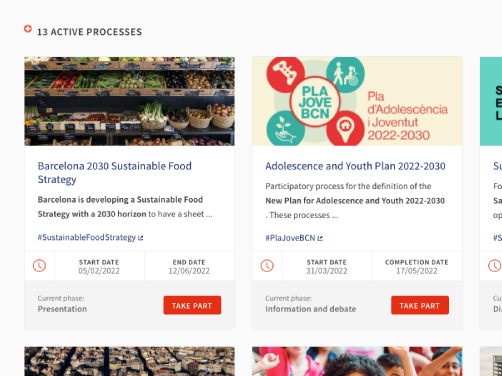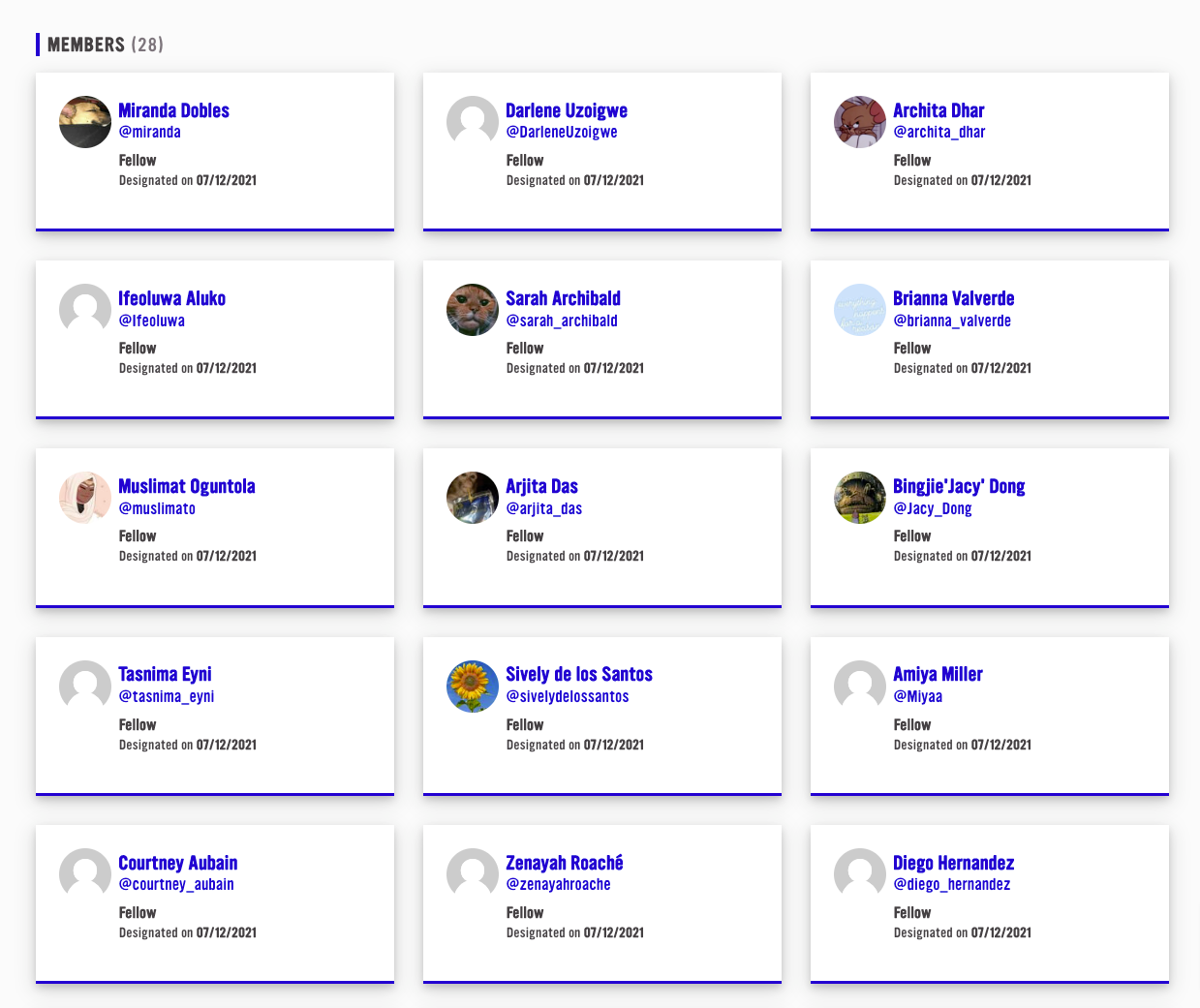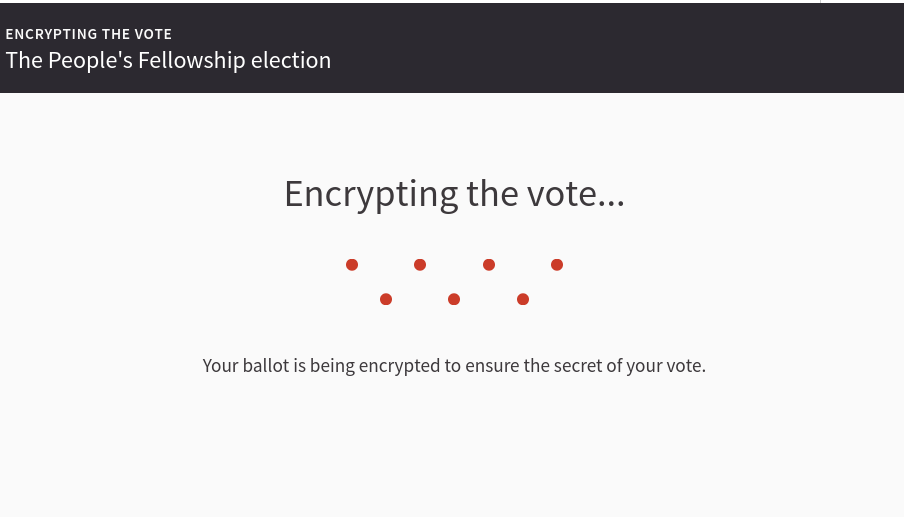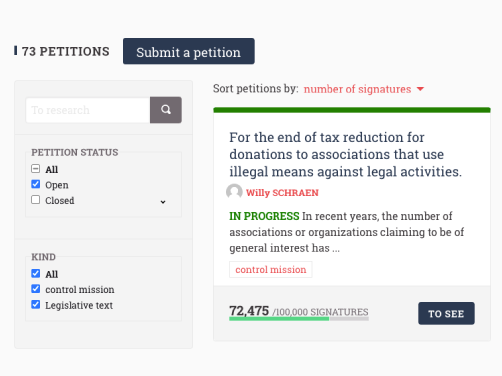Features
For democratic organizations and collectives of any size and kind.
You can use Decidim in a public or private organisation, with hundreds or thousands of potential participants, such as a city council, an association, a university, an NGO, a trade union, a neighbourhood association or a cooperative...
Thanks to Decidim you will be able to configure spaces for participation (initiatives, assemblies, processes or consultations) and enrich them through the multiple available components (face-to-face meetings, surveys, proposals, voting, follow-up of results, comments and many more).
Spaces for participation
- Participatory processes
- Assemblies
- Votings
- Initiatives
To democratize common issues, step by step
Processes is a space that allows to create, activate/deactivate, and manage various participatory processes. These are distinguished from other spaces by being structured in different phases within which all of the components can be incorporated. Examples of participatory processes are: an election process for members of a committee, participatory budgeting, a strategic planning process, the collaborative writing of a regulation or norm, the design of an urban space or the production of a public policy plan.

The power of collective self-organization
Makes it possible to set up decision-making bodies or groups (councils, working groups, commissions, etc.) that meet regularly, detailing their composition, listing and geolocating their meetings. It allows participation in them, for example, attending in person or online, adding issues to the agenda, or commenting on the proposals and decisions taken by that body.

The right to decide with all democratic guarantees
Makes it possible to coordinate referendums, trigger discussions and debates, get voting results published and connect to a secure e-voting system.

Setting everyone's agenda, within everyone's reach
Participants can create collaborative initiatives, define their path and goals, gather endorsements, discuss, debate and disseminate initiatives, set meeting points where signatures can be collected from attendees or debates open to other members of the organisation.

Participatory processes
Participatory processes To democratize common issues, step by step
Processes is a space that allows to create, activate/deactivate, and manage various participatory processes. These are distinguished from other spaces by being structured in different phases within which all of the components can be incorporated. Examples of participatory processes are: an election process for members of a committee, participatory budgeting, a strategic planning process, the collaborative writing of a regulation or norm, the design of an urban space or the production of a public policy plan.

Assemblies
Assemblies The power of collective self-organization
Makes it possible to set up decision-making bodies or groups (councils, working groups, commissions, etc.) that meet regularly, detailing their composition, listing and geolocating their meetings. It allows participation in them, for example, attending in person or online, adding issues to the agenda, or commenting on the proposals and decisions taken by that body.

Votings
Votings The right to decide with all democratic guarantees
Makes it possible to coordinate referendums, trigger discussions and debates, get voting results published and connect to a secure e-voting system.

Initiatives
Initiatives Setting everyone's agenda, within everyone's reach
Participants can create collaborative initiatives, define their path and goals, gather endorsements, discuss, debate and disseminate initiatives, set meeting points where signatures can be collected from attendees or debates open to other members of the organisation.

Components
Proposals
Your ideas in detail
Create a proposal using a creation wizard, compare it with the existing ones, publish it on the platform and include additional information such as geolocation or attached documents and images. This component also allows you to navigate, filter and interact with a set of proposals. In addition, with the proposal-incubator you can create collaborative proposals.
Voting
Decide your choice
Offers organisations the possibility of activating different voting or support systems around proposals: unlimited, limited to a given threshold, weighted, cost-based, etc. Backed by secure and encrypted e-voting technology.
Results
No proposal without an answer
Turn proposals into results and give official responses concerning their acceptance or rejection, merging various proposals into a single result.
Accountability
End-to-end transparency
It offers the possibility to subdivide results into projects, to define and apply progress states around their implementation, as well as to show the degree of achievement of results grouped by categories and scopes.
Meetings
To meet and not miss anything
The meeting component offers organizations and participants the opportunity to convene meetings, determine their location and time, register and limit attendees, define the structure and content of the meeting as well as publishing the minutes, and the resulting proposals.
Participatory texts
To analyze, synthesize, and build in common
Can be used to convert long text documents into several proposals or results and, vice versa, to compose and display a unified text based on a collection of proposals or results.
Conference
Where big events are premiered
Create a website for a big event. Unify the program by joining up a series predefined meetings (chats, workshops, etc.), and manage attendees.
Surveys
Because the opinion of your community matters
Design and publish surveys. Display and download results.
Sortition
Equality and the justice of randomness
Allows to select a number of proposals (e.g. candidates for a jury) with random, yet reproducible, procedures that guarantees non-biased and uniform distributions.
Comments
Building a collective intelligence
Enables users to add comments, to value them in favour, against or neutral, vote them, answer and receive notifications about responses.
Pages and blogs
Your community, informed and up to date
Create informative pages with rich text formatting, embedded pictures and videos. The blog component makes possible the creation of posts or news, and to navigate them chronologically.
Notifications
Personalised information on interesting content
Decidim enables you to track any space or component so that you can receive updates whenever they happen.
Newsletter
Simple but powerful
Send emails to everyone registered in the platform or to those who participate in a specific space.
Modules
Grow beyond the default components. The Decidim community has developed hundreds of modules to expand the platform beyond the basics and cater to your needs even better.
Explore the modulesFAQs
What is the Decidim Association?
The "Asociacion de Software Libre Decidim" (The Decidim Free Software Association) is a democratic association for the governance of the Decidim community. It was founded on February 16, 2019 in an extraordinary assembly of the community, with the approval of the organization statutes.
What is the Social Contract?
That's how we call our Code of Democratic Guarantees and Democratic Collaboration. All members of the community must endorse the Social Contract.
Do you support institutions?
Yes, but you have to be patient. There are a lot of institutions that want to use Decidim right now and we are helping them step by step. Contact us for any question and we will answer you as soon as possible.
What can a Decidim administrator do?
Easily configure participatory processes Do you want to make a strategic plan? Or discuss new regulations? Or discuss a new square or a public building to achieve the common good? Thanks to Decidim you will be able to configure participation spaces (initiatives, assemblies, processes or consultations) and enrich them through the multiple available components (face-to-face meetings, surveys, proposals, voting, follow-up of results, comments and many more).

